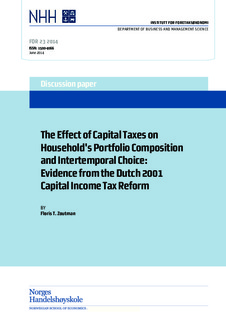The effect of capital taxes on household's portfolio composition and intertemporal choice : evidence from the Dutch 2001 capital income tax reform
Working paper

View/
Date
2014-06Metadata
Show full item recordCollections
- Discussion papers (FOR) [566]
Abstract
This paper estimates the effect of capital taxation on portfolio composition and savings using quasi-
experimental variation generated by the Dutch 2001 capital tax reform. The reform drove a wedge
between the taxation of housing and financial wealth and in addition affected the after-tax return
on all assets. I use unique administrative household panel data with information on capital income,
wealth and portfolio shares to exploit this variation. I derive and estimate a semi-structural model
which directly relates the share invested in financial wealth to the after-tax return on financial and
housing wealth. In addition, I link accumulated wealth in the reform-period to the change in the
after-tax return on total wealth. Elasticities have the expected sign but are modest in size. I find
some evidence for heterogeneity in the behavioral response. In particular, rich and single households
seem to be more responsive in terms of both portfolio composition and wealth accumulation, than
other households. The estimated elasticities can be used in capital tax models to calibrate the opti-
mal tax rate.